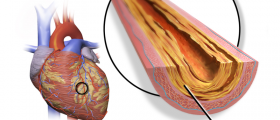
WHO Criteria for Metabolic Syndrome
Different organizations define this syndrome differently, so World Health Organization (WHO), considers the following four factors as main features of metabolic syndrome. High insulin levels or elevated fasting blood glucose or post meal glucose is the first factor. According to WHO, a person has metabolic syndrome if this first factor is combined with abdominal obesity, high triglycerides or low HDL (high density lipoprotein), the “good” cholesterol in the blood.
Abdominally obese are people whose body mass index is greater than 30kg/m2, with waist over 37 inches (94cm) or people in whom waist to hip ratio is over 0.9. Metabolic syndrome is also very likely in patients with high insulin and triglycerides over 150mg/dl or HDL cholesterol below 35mg/dl.
Prevention and Treatment
Patients who discover to have some of risk factors attributed to metabolic syndrome should change their lifestyles and strive to live healthier. Changing the way you eat and what you eat will have significant impact on your health and it will definitively decrease the chances for you to develop diabetes, heart disease or stroke.
So, if you want to prevent metabolic syndrome and its medical consequences, the best method is to start with a healthy diet. Eat plenty of fruits and vegetables, lean meats, fish and use herbs and spices instead of salt. Table salt should be avoided as well as over processed and fried food. Regular, moderate physical activity is also recommended course of action for everyone with risk factors for cardiovascular disease.
One of important things is to get regular check-ups and look after your blood pressure, level of glucose (blood sugar) and cholesterol in the blood. If these measures do not give expected results, ask your doctor for further recommendations and see what you can do.
Treatment measures are more or less the same as prevention and these include proper dieting (some suggest Mediterranean diet) and proper exercise (at least 30 minutes 5 days per week). If these treatments do not work, your doctor may prescribe medications to control high blood pressure, lipids and cholesterol in the blood. Drugs should lower patients’ blood pressure under 130/80mm Hg. Certain medications, such as ACE inhibitors, thiazolidinediones and metformin could be useful in several ways for patients suffering from diabetes so these might be your doctor’s choice in this situation.

















Your thoughts on this
Loading...